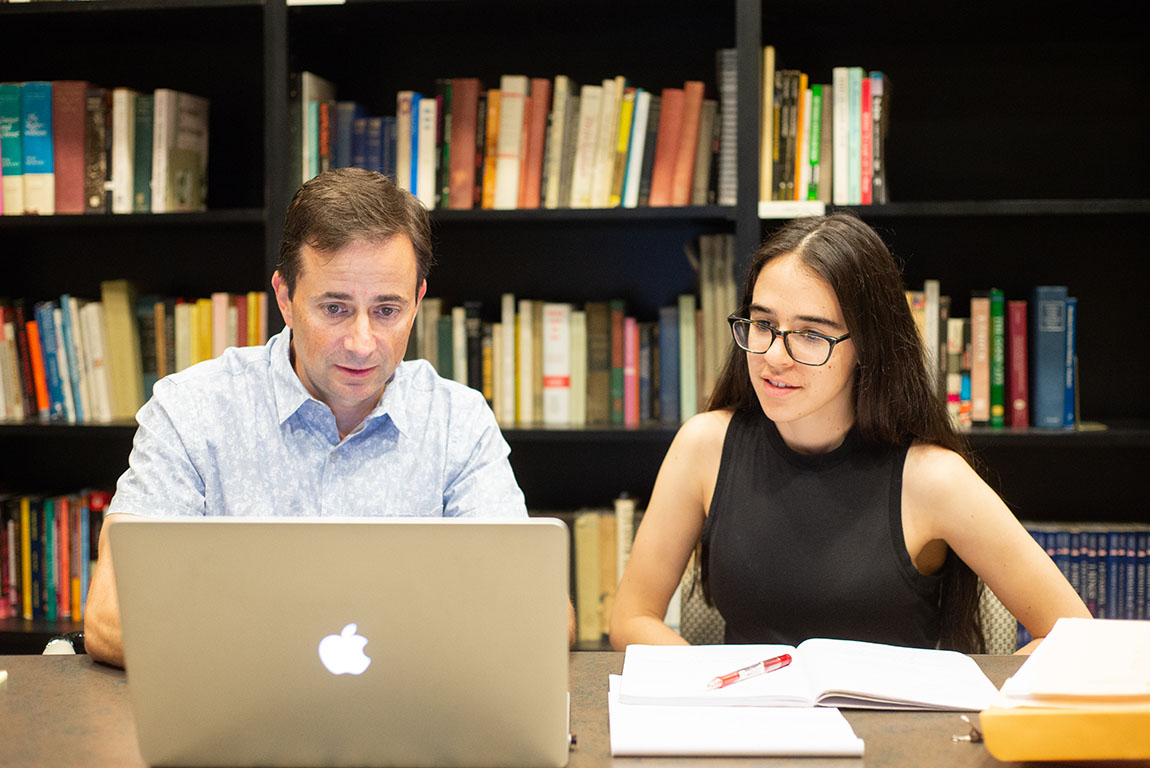Minding the Data
Psychology students work with a local nonprofit to collect and analyze information it can use to ensure its continued funding—and continued success.By: Meghan Kita Wednesday, June 26, 2019 03:20 PM
 Professor of Psychology Mark Sciutto and Tovia Marinstein ’20 look over data related to Shanthi Project's Mindfulness in the Classroom initiative.
Professor of Psychology Mark Sciutto and Tovia Marinstein ’20 look over data related to Shanthi Project's Mindfulness in the Classroom initiative.Instructors from the nonprofit Shanthi Project go into Lehigh Valley elementary, middle and high schools and teach mindfulness, the quality of being present in the current moment.
“Mindfulness is a very hot topic right now,” says Professor of Psychology Mark Sciutto, who began collaborating with Shanthi Project five years ago. “It teaches fundamental skills about how to self regulate, how to pay attention, how to respond to emotions: things that we know are important in a wide range of academic and social contexts.”
Shanthi Project instructors conduct an eight-week Mindfulness in the Classroom course with students and their educators that teaches breathing and movement techniques to foster a sense of calm and focus. The organization’s four mindfulness instructors worked with 120 classrooms across 15 schools last academic year.
Meanwhile, the nonprofit must also demonstrate the efficacy of its work in order to continue receiving funding from the United Way. That’s where Sciutto and his students come in. Most recently, last fall, he taught a course called Mindfulness Intervention Research Seminar. In it, students split into three groups to address emerging research needs of the Shanthi Project. Shanthi Project’s Board President and Founder Denise Veres and Director of In-Class Mindfulness and Classroom Teacher Training Brooke Kohler visited the class every other week to discuss the program and learn about the groups’ progress.
Tovia Marinstein ’20, a psychology major and creative writing minor, was part of the group working on “treatment fidelity,” that is, how often Shanthi Project teachers were able to deliver the program as it was designed to be delivered. These students worked with Veres and Kohler to pinpoint which elements of each session are most important and developed checklists for Shanthi instructors to fill out on their phones after each session.
“Working with them was this cool enmeshment of real thirst for bettering the world with kindness and compassion,” says Marinstein, a regular yoga practitioner who uses it as a pathway to mindfulness. “They’re truly a project that models what they’re teaching.”
Marinstein’s group collected data on which parts of the program were happening consistently, which weren’t and why (was there a fire drill? a snow day?). After the semester ended, Marinstein volunteered to analyze this data alongside data from questionnaires given to classroom teachers. This helps the nonprofit understand which elements of the program correspond with better outcomes and how they might work toward ensuring more classrooms get the best possible results.
“For instance, through Tovia's data analysis, we learned that classroom teacher engagement in our program was an important element to the overall success of the program for the students,” Veres says. “We have taken that information and are now looking at how we can enhance classroom teacher participation in our mindfulness program. Information like this is vital to making our programs more successful.”
Marinstein is on campus this summer, working on analyzing data from the first half of the year in advance of Shanthi Project’s August report to the United Way. Muhlenberg received a $4,600 Mellon Community Engagement Grant for this fall to support two research assistants—Marinstein and Brooke Bailey ’20, a psychology major and women’s and gender studies minor—to continue research projects that originated in Sciutto’s class. And, Sciutto hopes to offer Mindfulness Intervention Research Seminar again next spring to build upon the work that’s already taken place.
“We want to blur the boundaries of the classroom,” Sciutto says, referring to himself and his department colleagues. “We want students to take psychology out into the community and to interact with the community in an informed way, and then bring that back into the classroom.”
